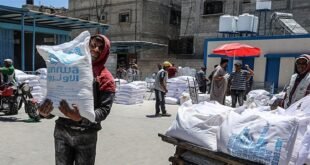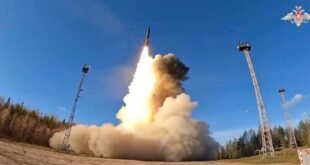02-04-2024
MELBOURNE: Israel’s continued assault on Gaza has highlighted a hidden yet crucial component of the world’s weapons manufacturing industry suburban Australia.
Tucked away in Melbourne’s industrial north, Heat Treatment Australia (HTA) is an Australian company that plays a vital role in the production of F-35 Joint Strike Fighters; the same model that Israel is using to bomb Gaza.
 Weekly protests of about 200 people have been taking place for months outside the nondescript factory, where heat treatment is applied to strengthen components for the fighter jet a product of US military giant Lockheed Martin.
Weekly protests of about 200 people have been taking place for months outside the nondescript factory, where heat treatment is applied to strengthen components for the fighter jet a product of US military giant Lockheed Martin.
While protesters have sometimes brought production to a halt with their pickets, they remain concerned about what’s going on inside factories like HTA.
“We decided to hold the community picket to disrupt workers, and we were successful in stopping work for the day,” Nathalie Farah, protest organizer with local group Hume for Palestine, told media. “We consider this to be a win.”
“Australia is absolutely complicit in the genocide that is happening,” said 26-year-old Farah, who is of Syrian and Palestinian origin. “Which is contrary to what the government might have us believe.”
More than 32,000 Palestinians have been killed since Israel launched its war in Gaza six months ago after Hamas killed more than 1,000 people in a surprise attack on Israel. The war, being investigated as a genocide by the International Court of Justice (ICJ), has left hundreds of thousands on the brink of starvation, according to the United Nations.
HTA which did not respond to media for comment is just one of an increasing number of companies in Australia engaged in the weapons manufacturing industry.
 According to Lockheed Martin, “Every F-35 built contains some Australian parts and components,” with more than 70 Australian companies having export contracts valued at a total 4.13 billion Australian dollars ($2.69bn).
According to Lockheed Martin, “Every F-35 built contains some Australian parts and components,” with more than 70 Australian companies having export contracts valued at a total 4.13 billion Australian dollars ($2.69bn).
Protesters have also picketed Rosebank Engineering, in Melbourne’s southeast, the world’s only producer of the F-35’s “uplock actuator system”, a crucial component of the aircraft’s bomb bay doors.
In recent years, the Australian government has sought to increase defence exports to boost the country’s flagging manufacturing industry.
In 2018, former Prime Minister Malcolm Turnbull announced Australia aimed to become one of the world’s top 10 defence exporters within a decade. It is currently 30th in global arms production, according to the Stockholm International Peace Institute.
It is an aspiration that appears set to continue under the government of Anthony Albanese after it concluded a more than one-billion-Australian-dollar deal with Germany to supply more than 100 Boxer Heavy Weapon Carrier vehicles in 2023 Australia’s single biggest defence industry deal.
Since the Gaza war began, the industry and its business relationship with Israel have come increasingly under the spotlight.
Last month, Deputy Prime Minister Richard Marles insisted that there were “no exports of weapons from Australia to Israel and there haven’t been for many, many years”.
However, between 2016 and 2023 the Australian government approved some 322 export permits for military and dual-use equipment to Israel.
The Department of Foreign Affairs and Trade’s own data available to the public online shows that Australian exports of “arms and ammunition” to Israel totaled $15.5 million Australian dollars ($10.1m) over the same period of time.
Officials now appear to be slowing the export of military equipment to Israel.
In a recent interview with Australia’s national broadcaster ABC, the Minister for International Development and the Pacific Pat Conroy insisted the country was “not exporting military equipment to Israel” and clarified this meant “military weapons, things like bombs”. (Int’l Monitoring Desk)
 Pressmediaofindia
Pressmediaofindia




